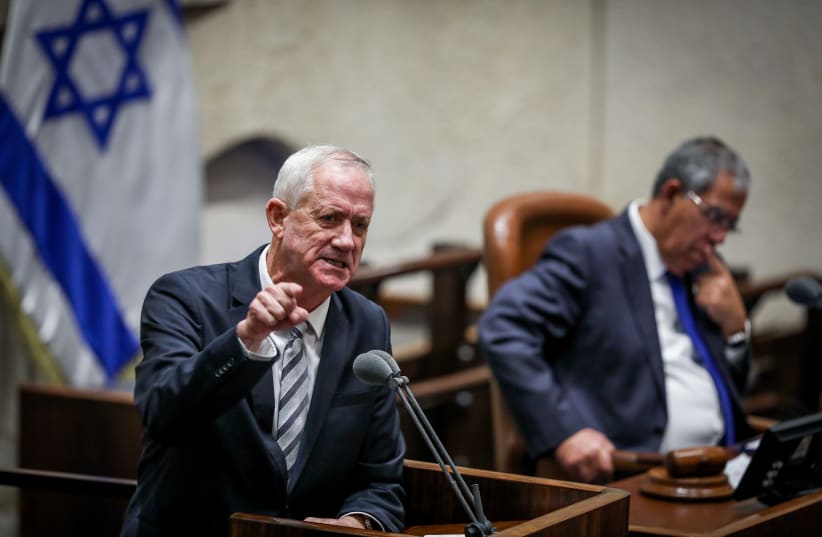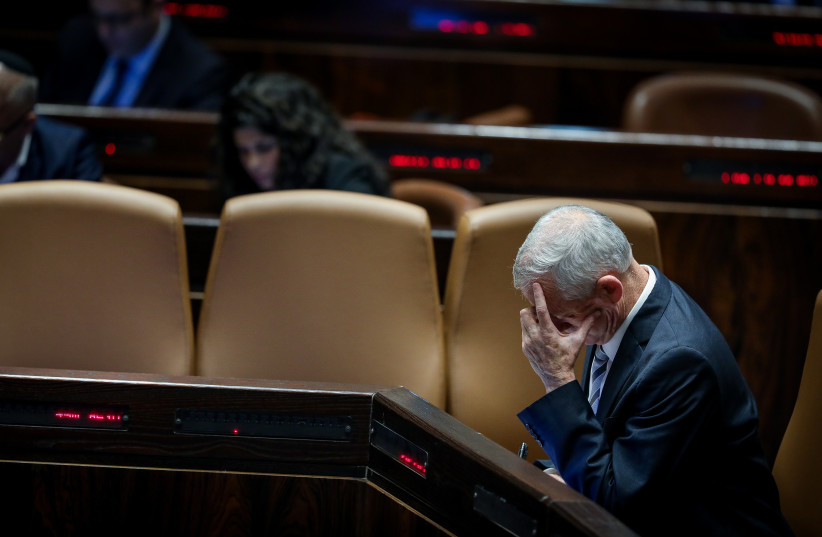Bitterness between the coalition and opposition over the recent election spilled over on Sunday evening at the Knesset memorial for Yitzhak Rabin, who was assassinated by Jewish far-right extremist Yigal Amir on November 4, 1995.
While Prime Minister Yair Lapid, opposition leader MK Benjamin Netanyahu and Transportation Minister Merav Michaeli spoke in a subdued manner, Defense Minister Benny Gantz went off script, leading to calls and accusations between both sides of the aisle over who incited against whom in their election campaigns.
Lapid said in his speech that Rabin was a man who understood the meaning of force, but also that force was not the foundation upon which a democracy stands.
His speech included a number of thinly veiled criticisms of opposition MKs.
“Power does not come from pistols being brandished,” Lapid said, clearly referring to MK Itamar Ben-Gvir, who pulled out his pistol in Sheikh Jarrah after Israeli Arab youth threw stones at him. “It is the weapon of the cowards, it is the weapon of lawbreakers, it was the weapon of Yigal Amir. The strength of the State of Israel was built by Rabin and his friends on completely different foundations.”
These included the rule of law, international acceptance and alliances, democratic might and the pursuance of peace.
“It’s common to say that you can murder people but that you can’t murder ideas. This is not true. You can kill ideas. The most beautiful ideas are murdered all over the world every day. What will happen with Rabin’s perception of power is up to us. It depends on what we do in the coming years,” Lapid said.
“If Israel abandons the rule of law, dismantles its democracy, reverses our progress and ties with the international community, and completely abandons the pursuit of peace, then it will be a weaker state, and Rabin’s ideas will be buried alongside it,” the outgoing prime minister warned.
Netanyahu struck a conciliatory tone.
“The differences of opinion will not disappear – and that’s fine,” the presumptive next prime minister said. “In several areas we have sharp debates, which also need to be managed with responsibility and consideration. Ideological struggle is an institutional foundation in democracy. Arguing is allowed, you don’t have to agree on everything – but on the other hand, you need to know what to agree on, what most of us agree on,” he said.
Michaeli spoke about Rabin as a leader by example, and not by self-pity and always claiming to be the victim. She also claimed that the people that were about to take over the country were the ones who incited against Rabin in the mid-90s.
Gantz spoke next and went off script, raising his voice and calling out what he claimed was the hypocrisy of Netanyahu’s calling for unity just days after a group of teens greeted Gantz at the Western Wall with cries of “murderer” after Netanyahu claimed in the days leading up to the election that Gantz was responsible for unnecessarily endangering IDF soldiers.
The defense minister was visibly furious, and called on Israel to look forward to the next 27 years, instead of the past 27 years.
“I fear for the country,” Gantz said. Although he did not mention Netanyahu by name, he repeatedly said that “words lead to actions – that the person who spoke them has no control over them.”
Gantz warned that it was a matter of time until the next assassination.
The tension that was palpable under the surface broke into the open during Gantz’s speech, as members of the opposition called out in response that he was exaggerating.
Smotrich spoke next and his speech was interrupted as well, as the leader of the Religious Zionist Party argued that a “blame campaign” began the day after the assassination against the entire Right and religious Zionists.
MK Ahmad Tibi spoke last, and said that it was the first time that he was speaking during a Rabin memorial due to the “special political circumstances.”
Tibi attacked both sides of the political divide.
He accused the Right of intending to bring a “fascist” party into the government, but also the Center-Left for acting paternalistically and allowing the right-wing side of the previous government to implement its policies.
"The near future is going to be bad for us, but it will also be bad for you."
Ahmad Tibi
“The near future is going to be bad for us, but it will also be bad for you,” Tibi said to the Center-Left. He called on what is soon to be the opposition to join as partners in opposing the upcoming government.
Herzog, Lapid speak out against divisions in Israel
Earlier on Sunday, President Isaac Herzog and Lapid spoke at Israel’s official Memorial Service for Rabin at Mount Herzl.
Herzog spoke to both the winners and losers in the election.
“I turn to the winners and say to them what I have said throughout the last year to their predecessors, to their political opponents: You do not have to give up the worldview for which you were elected,” Herzog said.
“But at the same time, respect each other. Hug your brothers and sisters on the losing side. Be attentive to their needs, their pain, their dreams. Remember: the elections in Israel are not a 'zero sum game.' Do not be afraid to compromise and reach a middle ground, in order to avoid a schism and a rift within us,” the president said.
“To the losing camp I say: The country is not finished nor destroyed. The democratic decision must be respected. Continue to make your voice heard and fight for your positions, as in any healthy democracy,” he said.
“To all our brothers and sisters in Israel and the Diaspora, to everyone who voices anxiety and concern in Israel and the world, I say: We are all committed to the fate of the State of Israel; we are all committed to its basic existence as a Jewish and democratic state that maintains the rule of law, human and civil rights, and respect for all minority groups within it. We will continue to protect our foundations as a people, as a society and as a country.”
Lapid, who spoke after Herzog, stressed that while he would not act to enhance the hatred between the two political camps, he will not join the next government under any circumstance.
“There is no ‘us and them,’ only ‘us,’” Lapid said.
“Rabin’s murder was an assassination attempt on the very idea of a shared life. We barely survived it, but the wounds have not yet healed. It is our job to heal them every day anew,” he said.
“An absolute majority of Israeli citizens are not ready to let hatred rule their lives; not ready to hate their neighbors, those who served with them in the IDF, those who sit with them at the Shabbat table,” Lapid continued.
“The government led by me lost the election last week. I’m not going to waste my life hating whoever won. I’m not getting ready to turn my back on those who didn’t choose us. Those who believe in Israeli democracy when they win, should also believe in it when they lose.”
But “there is no scenario or situation in which we will enter the new government,” the outgoing prime minister said.
“We will fight from the opposition for our worldview and the values of a huge public that elected us. We will fight – until we return to power.
“We will be an opposition to the government, but we will never be an opposition to the state,” Lapid said, echoing criticism he voiced against the opposition while he was in power.
“Our democracy may not appear in scripture, but this ceremony is a reminder that our democracy is sanctified in blood. Yitzhak Rabin was murdered by a person for whom violent incitement led him to believe that he should not accept the voter’s decision. This, too, we must remember and not forget,” Lapid said.
No member of the Rabin family spoke at the ceremony, in order not to become involved in the political discourse, the family said in a statement. In the past, they have accused Netanyahu of leading the incitement that led to the murder.
Despite the family’s decision not to speak, Netanyahu avoided the ceremony. He did not attend it last year either.

